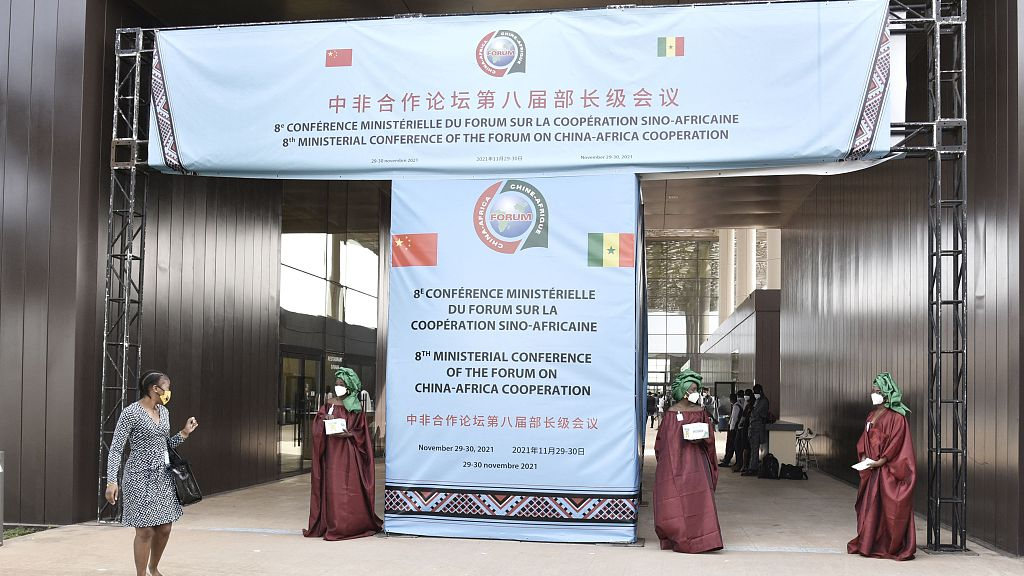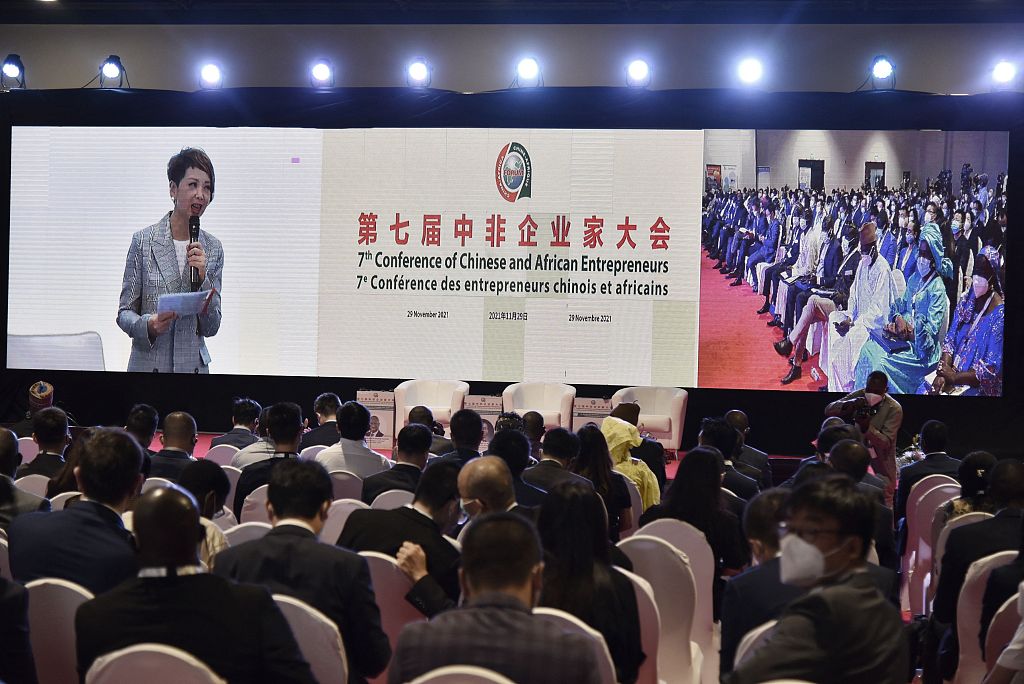
Senegalese delegates enter the conference hall during the ministerial level conference of the Forum on China-Africa Cooperation in Dakar, Senegal, November 29, 2021. /CFP
Senegalese delegates enter the conference hall during the ministerial level conference of the Forum on China-Africa Cooperation in Dakar, Senegal, November 29, 2021. /CFP
Editor's note: Ikenna Emewu is a journalist and editor-in-chief of Africa China Economy Magazine, Nigeria. His primary research interests are China's international relations and "socialism with Chinese characteristics." The article reflects the author's opinions and not necessarily the views of CGTN.
The Dakar ministerial level conference of the Forum on China-Africa Cooperation (FOCAC) was held against all odds at a time the world is in panic over the renewed vigor of COVID-19.
The leaders met to deepen the China-Africa partnership, promote sustainable development and to build a China-Africa community with a shared future in a new era.
The agenda paid off with warm conclusions to further the good relations that have only gotten stronger in the past 21 years.
Hosting that conference signposts the firm resolve of the FOCAC to remain strong in the face of headwinds the entire world faces.
On the African side, the FOCAC has redefined the relationship of the world with Africa from an abysmal nadir to a dignified zenith.
China's relationship with Africa via the FOCAC has forced a reset of the way other powerful entities see Africa, especially with the patent gains of the FOCAC on Africa, economically and infrastructurally, and on China's global clout and visibility.
Last month, on the heels of the FOCAC conference, Antony Blinken, U.S. Secretary of State took a tour of three sub-Saharan African countries, including Nigeria.
Media reports, including by Aljazeera, reported that the trip was most likely to counter China and the FOCAC meeting.
In Abuja, Blinken, without mentioning names, had mooted that the U.S. has plans to overhaul the approach to Africa to treat it as a ''major geopolitical power,'' and that would boost development without strings often attached to such deals.
He alluded that "too often, international infrastructure deals are opaque, coercive. They burden countries with unmanageable debt."
That reference was indisputably a jab at China during his address to ECOWAS member states in Abuja. He promised that "we will do things differently."
The U.S. ''doing things differently'' in Africa is necessitated by the pace at which China has been moving with the continent in the past 21 years. The platform has forced others to quicken their steps and strategy towards Africa as China sets the standards and rules of today's multilateral diplomatic engagement.
Confirming whom Blinken was actually referring to, the Nigerian Foreign Minister, Geoffrey Onyeama in his response told Blinken there was no need for his comparisons and concerns about China because "we would have gone with anybody else that was providing something at a competitive rate for us."
In late November till early December, the Nigerian media was awash with the news of how the China Civil Engineering Construction Corporation (CCECC) had in five years delivered 717 km of railway to boost Nigeria's transport infrastructure, partly funded through loans from the China EXIM Bank at a time the Nigerian government could ill afford funding for the four major railway projects.
The U.S. or any other strong economy never did that for Nigeria; all these were made possible through the FOCAC and the Belt and Road Initiative.

Chinese delegates follow the proceedings via a videolink during the China-Africa Cooperation (FOCAC) meeting in Dakar, Senegal, November 29, 2021. /CFP
Chinese delegates follow the proceedings via a videolink during the China-Africa Cooperation (FOCAC) meeting in Dakar, Senegal, November 29, 2021. /CFP
Blinken's visit wasn't a coincidence given similar scenarios in 2018 when the FOCAC conference was hosted in Beijing. In March 2018, Rex Tillerson, then U.S. Secretary of State visited five African countries – Nigeria, Ethiopia, Chad, Kenya and Djibouti – ostensibly to counter the expected crucial summit in Beijing later that year.
A few months after, the then Prime Minister of the UK, Theresa May, toured three African countries in the same week as German Chancellor Angela Merkel.
Regarding the trip by May, a major media platform had challenged her to ensure that the diplomatic globetrotting didn't just benefit the UK, but Africa also as the continent needed infrastructure investment which the BRI provides.
The same week the two powerful European women called in Africa, former U.S. President Donald Trump had hosted Kenyan President Uhuru Kenyatta in Washington, also a few weeks to the Beijing FOCAC.
What the West would not deny is that China through the FOCAC taught them how to relate to Africa.
Was it another coincidence that in less than a month after the Beijing FOCAC was held, Russian President Vladimir Putin played host to African leaders, a meeting the Carnegie Endowment for International Peace said was to rile the West?
Once again, the FOCAC ended with outstanding agreements on the best way forward. To consolidate the gains so far, we would only urge that there is no need to change a winning formula.
The parties should walk the talk in building on the decisions in the 32-point conclusions at the conference.
The plans to better cooperation in technology, education, media partnership, culture exchange, climate change actualization and many others need to be worked hard at, while we hope that the next three years keep dictating the pace for global integration – making China the model of multilateral diplomacy and Africa a place that has inherited worth and pride.
(If you want to contribute and have specific expertise, please contact us at opinions@cgtn.com.)

